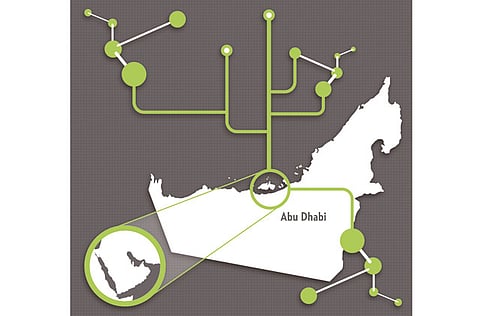Abu Dhabi eyes tech future
Capital seeks to play a key role in research and development

Double-dip recession or not, global consumers are retaining a crush on their personal electronic goods and super smart mobile devices.
Even in tough economic times, the confluence of advances in computing, communications, mobile handsets, digital content and growing worldwide adoption of the internet is fuelling new purchases and creating a mobile revolution.
Not surprisingly, this consumption is becoming more Asia-centric. While China's gross domestic product constitutes roughly 60 per cent of the GDP of the US, China already consumes more electronics than the US, attributable to China's large middle-class of 400 million citizens.
Powering each of these electronic devices is a semiconductor chip, the "brain" that manages performance of each electronic good — whether it's a laptop, mobile phone, or even your new washing machine or automobile.
Semiconductors are synonymous with innovation and productivity. Over the past 50 years, the semiconductor industry has transformed our way of life through intense innovation. We have leapfrogged from the invention of mainframe computers in the 1960s to the ubiquity of personal computers in the 1980s to the internet in the 1990s.
Mobile revolution
Now the mobile revolution is at hand: over one billion units sold with another nine billion on the way, all connected over wireless broadband links to millions of data servers via the "cloud," delivering content and services anytime, anywhere.
The more mobile, more integrated, more Asia-centric, more digital world has significant implications for us in Abu Dhabi. Why? Because Abu Dhabi is investing in the development and manufacturing of this growing and influential sector.
In 2008, Abu Dhabi decided to make a substantial investment in semiconductor manufacturing. It is one of the most technologically complex and sophisticated industries on earth. Over two billion transistors can fit on a microchip the size of your fingernail.
No other industry on earth doubles its productivity with little additional cost to consumers. Imagine an automobile coming to market using half the gasoline, giving you twice the mileage, with increased speed at a lower cost — every two years.
If you look at Taiwan, Singapore or high-tech clusters like Saxony in Germany or Silicon Valley, you can see what an advanced technology network of talent and technology can do to create job growth and economic transformation. This investment is fully in line with Abu Dhabi's 2030 vision to diversify our economy over the next two decades. The semiconductor industry is also as global as any industry can get.
To date, the Advanced Technology Investment Company of Abu Dhabi has committed over $10 billion to our portfolio company, GLOBALFOUNDRIES, rapidly making it one of the largest semiconductor manufacturing companies on earth. In addition to facilities in Singapore, Dresden and upstate New York, we announced on June 1 our intention to create an advanced technology ecosystem in Abu Dhabi.
Our goal is to be more integrated with leading technology clusters. But you cannot create a vibrant technology cluster in Abu Dhabi without investing in research and development. You need the collaboration of academic institutions and internationally recognised research entities to bring this innovation to life here in Abu Dhabi. We need new students, teachers and academia to collaborate on innovation with industry leaders. That is what has worked so well in other parts of the world.
That is why the Abu Dhabi Education Council's (ADEC) recent announcement unveiling its higher education strategy is so significant. The goals are a) to raise the quality of Abu Dhabi's higher education to international levels; b) to align education with Abu Dhabi's economic, social and cultural needs; c) to build and maintain a research ecosystem to drive an innovation-based economy; and d) to make education affordable and accessible.
By 2018, the annual spend on this strategy will be Dh4.9 billion, much of it directed at research and development. This will elevate Abu Dhabi's R&D expenditure to around 0.75 per cent of GDP, approaching advanced world levels which range from 1.5 per cent of GDP to just over four per cent of GDP.
Implementation plan
This will not only be essential to semiconductors and advanced technology, but will drive innovation in aerospace, health care, and renewable energy, among other key pillars of the 2030 diversification strategy.
ADEC will now begin putting in place an implementation plan and we will support them by pulling in our global network of partners to realise a strong semiconductor R&D presence in Abu Dhabi.
The ADEC announcement came on the heels of a major semiconductor industry conference ATIC hosted in Abu Dhabi. In May, over sixty representatives of the world's most respected research institutions, in conjunction with the Semiconductor Research Corporation and the National Science Foundation, came to the Emirate to discuss the major research challenges facing the semiconductor industry.
We shared ideas but as importantly, began to gain their enthusiasm for the journey ahead and how Abu Dhabi can play a key role in their future research and development efforts. It is all part of an effort to shape our "human capital" here in Abu Dhabi.
Abu Dhabi's 2030 vision and its investments in the future have put the us on the path toward bringing that innovation home. One day, the device in your hand will have components in it that are designed in the US, developed and manufactured in Abu Dhabi, assembled in Singapore, and packaged in China. We have a long journey ahead of us, but we are investing in the critical components to make it a reality here in Abu Dhabi.
The writer is the Chief Executive Officer of the Advanced Technology Investment Company.



